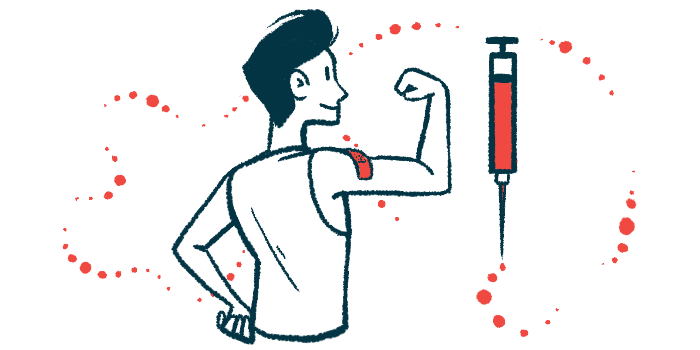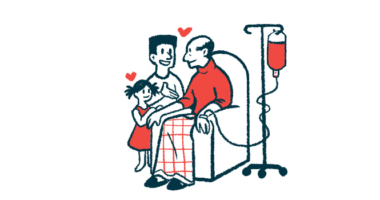Enjaymo prevents CAD worsening after COVID-19 vaccine in man, 70
Patient suffers no complications with 5th Comirnaty dose after infusion

The use of Enjaymo (sutimlimab) was seen to prevent symptoms of cold agglutinin disease (CAD) from worsening in an elderly man in Japan following repeated vaccination against COVID-19, according to a case report.
The patient had experienced CAD-related crises after receiving a third and fourth dose of the COVID-19 vaccine Comirnaty. Nonetheless, the man sought a fifth vaccination against SARS-CoV-2, the virus that causes COVID-19.
Clinicians gave the elderly man Enjaymo, an approved antibody-based therapy, shortly before that fifth dose — and no such attack occurred.
“This case indicates that [a COVID-19] vaccination can cause … crisis in patients with CAD and that appropriate [Enjaymo] administration can suppress the SARS-CoV-2 … vaccination-induced exacerbation of CAD,” the researchers wrote.
The report, “Sutimlimab suppresses SARS-CoV-2 mRNA vaccine-induced hemolytic crisis in a patient with cold agglutinin disease,” was published in the Journal of Clinical and Experimental Hematopathology.
Patient diagnosed with CAD, with signs of Raynaud’s phenomenon
CAD is caused by cold agglutinins, which are self-reactive antibodies that bind to red blood cells when body temperatures fall well below normal. This results in red blood cell destruction, known as hemolysis, which leads to anemia — a condition in which there are not enough red blood cells to carry oxygen across the body.
Sometimes, the autoimmune condition is triggered by an infection, in which case it is called secondary CAD.
A few cases have been reported of people who experienced new or worsening CAD symptoms after a COVID-19 infection or following vaccination to protect against the disease.
Now, researchers in Okayama, Japan, described the case of a 70-year-old man with CAD in whom administration of Sanofi’s Enjaymo right before a fifth dose of a COVID-19 vaccine prevented vaccination-induced symptom worsening.
The man had been diagnosed with CAD a few years prior, with signs of Raynaud’s phenomenon — a condition in which blood vessels narrow, causing the affected areas of the body to feel numb and prickly. Although his anemia had worsened since his diagnosis, he did not experience any of its symptoms.
After getting vaccinated with the first and second dose of Comirnaty, Pfizer-BioNTech’s mRNA-based COVID-19 vaccine, the man did not experience any side effects. However, after a third shot, he had trouble breathing and felt unwell.
The man was admitted to the researchers’ hospital, where a physical examination revealed skin paleness and yellowing of the whites of the eyes, suggesting a hemolytic crisis. In such crises, red blood cells are lost at a much faster rate than they are produced.
Blood tests revealed lower than normal levels of hemoglobin, the protein that carries oxygen in red blood cells, and high levels of hemolysis markers. He also was positive for cold agglutinins, consistent with his CAD diagnosis.
“The patient received a red blood cell transfusion and was treated with 35 mg of prednisolone [a corticosteroid] daily to avoid an immune response,” the researchers wrote.
While the levels of hemolysis markers showed a gradual reduction, “his hemoglobin level did not reach the normal range,” the team wrote.
No evidence of red blood cell destruction after vaccination seen with Enjaymo
Doctors anticipated that his hemolysis would worsen with colder temperatures during winter, and noted that they planned to treat him with Enjaymo in the autumn.
Enjaymo, approved in both the U.S. and Europe for adults with CAD, is given as an infusion directly into the bloodstream every other week. It works by suppressing a part of the immune system that’s implicated in CAD’s autoimmune attacks, thereby preventing excess hemolysis and easing symptoms.
Because Enjaymo increases the risk of infection caused by certain bacteria, the man received a pneumococcal and meningococcal vaccine prior to treatment, without any side effects.
In the meantime, he received a fourth dose of Comirnaty, which triggered another hemolytic crisis. While the anemia resolved gradually with corticosteroids, his hemoglobin levels continued below normal.
One month after the hemolytic crisis, the man finally began Enjaymo treatment, which helped to increase hemoglobin, but was unable to resolve his Raynaud’s phenomenon.
“Based on the patient’s clinical course, the exacerbation of hemolytic anemia induced by the SARS-CoV-2 mRNA vaccine was reproducible,” the researchers wrote. “However, he wanted to receive a fifth vaccine.”
Notably, [the patient] had no complaints of fatigue after the fifth vaccination, and laboratory findings showed no evidence of hemolysis.
This time, he was vaccinated a few hours after receiving an Enjaymo infusion.
“Notably, he had no complaints of fatigue after the fifth vaccination, and laboratory findings showed no evidence of hemolysis,” the team wrote, suggesting that Enjaymo treatment was successful.
While the findings come from a single case, the researchers suggest that Enjaymo may be used to avoid or ease the symptoms of a hemolytic crisis in CAD patients with a history of symptom worsening secondary to COVID-19 vaccination.
“Our report suggests an effective preventive strategy [with Enjaymo] to avoid or minimize hemolytic attacks induced by the SARS-CoV-2 mRNA vaccine in susceptible populations,” the team concluded.








